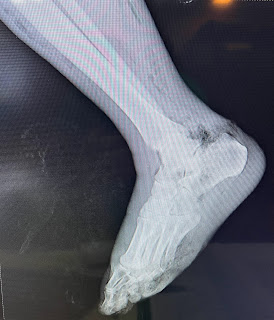Three Weeks, Hundreds of Lives, One Humanity
I have always been fond of numbers- mathematics was one of my favorite subjects in school as a kid. Perhaps it's the predictable order by which numbers are arranged or the defined formulas in which numbers are used that brings me a sense of comfort and satisfaction. Or rather, maybe it's the fact that one can produce a given number from any other number by the use of a multitude of available formulas and calculations. In today's equation, I recount how the number three turns into hundreds which turns into one. And no, I haven't ventured to find a mathematical formula to explain it.
A lot can happen in three weeks. In my short time here at Loma de Luz I have witnessed new lives being brought into the world, older lives taking their last breaths, and other lives transitioning between these two earthly experiences. I have had the privilege of being involved in one way or another with hundreds of people in times of immense hope, great suffering, and predictable mundanity. And though I won't bore you by recounting every experience, I wish to highlight a few examples that provide a glimpse into the complexity and beauty of our one common humanity.
Hope.
It wasn't the ideal way of birthing her first child on that dark, rainy evening. After a thirty minute wet and bumpy ride along the muddy roads of the northern Honduran coast, she stumbles into the hospital writhing in labor pains. The midwife evaluates the patient, and to her surprise, there's a foot! "When's your due date," she asks. A quick calculation later, it's apparent the patient is only 32 weeks pregnant. The mother's body is doing everything in its power to expel the child from the womb in hopes of finally quelling its metronome of painful contractions. For those who are familiar with obstetrics, it is preferable to opt for a cesarean delivery when the child is coming out feet- or butt-first, especially in a first-time mother. But there was no time for C-section preparations. The mother quickly gave birth to her baby daughter with notably purple legs, evidence of the child's long exposure to the cruel and unfamiliar cool air of the outside world.
The team rallied together quickly, supporting the infant's breathing with oxygen and extra pressure through a face mask to help open up the baby's lungs. Infants born this early can't feed normally, so we also placed a catheter in the baby's umbilical vein and another down her nose and into her stomach. It's important to confirm the location of each catheter, so we get an X-ray. This requires a much more arduous journey than I anticipated. In the United States, a technician arrives with a portable X-ray machine and takes a quick photo. Here, the midwife carries the baby wrapped in blankets with a series of fragile tubes and catheters while I walk beside her carrying a portable oxygen tank and a machine that helps push air into the baby's lungs. It's dark and raining outside, and we walk in haphazard synchronicity as cautiously and quickly as we can- keeping the baby warm is a priority (though in my mind, my top priority is to keep myself from tripping and falling). We all survive the journey back to the baby's warmer, and we have hope and faith in God that the baby will survive the even longer journey ahead.
Suffering.
Just the night before, I find myself in the emergency room with a patient with advanced liver disease- she is young, and there is no way for us to know what the cause is. Because her liver is failing, so too are her kidneys, and in turn her blood vessels. Her body can't sustain a blood pressure strong enough to provide necessary blood flow and oxygen to the rest of her body. Her abdomen is so full of fluid that she can't comfortably sit upright or lie on her back. I sit down at the patient's bedside as I patiently drain fluid from her belly with a procedure called a paracentesis. I quickly realize she is not going to tolerate being in the same position for very long and it's important that she not move because there's a needle in her belly. So I can't just leave her there for hours as the fluid slowly drains by gravity into a plastic bag (here, there are no fancy vacuum containers like there are in the US that quickly drain fluid by suction). I proceed to remove almost five liters of fluid...sixty milliliters at a time with a syringe. Yes, more math- that's about eighty times! My hands and fingers would have to forgive me later.
I do what I can to raise her blood pressure with medications, off-load the extra fluid in her body so she can breathe comfortably. However, it quickly becomes apparent that she is approaching the last moments of her life. "What can be done to save her?" is the unspoken question raised by the worried eyes and facial expressions of her family. Her kidneys- she needs dialysis, a special and costly procedure to filter her blood. Her liver- she needs a liver transplant. Neither are available here or now. I feel helpless. The family consoles me by telling me what I never would be able to tell them: "she's in God's hands now."
The Mundane.
One morning as I am preparing for a day of clinic patients, I see the reason for the patient's visit: "diabetes follow-up." I think to myself, "here we go again, another patient with diabetes who probably has a hemoglobin A1c of 13" (for those not familiar with the A1c, it's a marker of one's blood sugar levels over the long-term and the goal number is less than 7). She rolls into the office in her wheelchair. She has had a fractured ankle for almost two years and only recently was able to seek care in hopes of getting it fixed with surgery. Three months ago she was told she could not undergo surgery because her blood sugars were too high, a harbinger of poor healing and possible wound infection. She was afraid she would never be able to walk again. I open up her chart and to my surprise, her A1c is under 7 (it was 13 a few months ago)! She tells me she has been taking her medications every day as prescribed, has lost more than 10 pounds, and has changed her diet as instructed. She has done what, from my experience, most people can only do with the help of insulin injections. I congratulate her on her achievement, and I schedule her an appointment with the surgeon. She leaves my office with tears streaming down her face.
Numbers. Three weeks, hundreds of lives, one humanity.
"He numbers the stars, and gives to all of them their names." ~ Psalm 147:4




Thank you for sharing these stories. You write very well and your words help me to picture the work you are doing and the people you are seeing.
ReplyDelete